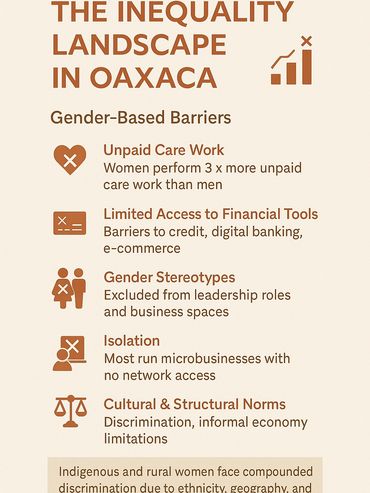About the Project

The project
Fémina Oaxaca is a project of the non-profit Asociación Civil Laboratorio de Investigación Social y Políticas Públicas, established on January 10, 2022, in Asunción Nochixtlán, Oaxaca. The association’s purpose is to promote assistance, social and sustainable development, and support for vulnerable populations through social guidance, education, and job training. This includes counseling in areas such as family, education, nutrition, employment, gender issues, discrimination, health, and quality of life. Fémina Oaxaca specifically empowers women entrepreneurs in the Oaxaca City metropolitan area, particularly those in the informal sector, by offering business training, helping establish points of sale, and fostering commercial alliances. The project also acknowledges the burden of unpaid care work and integrates self-care practices and sexual and reproductive health education to ensure the well-being and sustained participation of women in economic life.
Goals
The goal of the Fémina Oaxaca project is to empower female entrepreneurs in the metropolitan area of Oaxaca City, particularly those operating in the informal sector, by enhancing their business capabilities, expanding their market access, promoting their overall well-being, and supporting the formalization of their businesses. Since its inception in late 2022, Fémina Oaxaca has positively impacted the lives of over 100 women. Building on this success, the project aims to integrate an additional 60 women into its program Emprende Fémina, providing them with comprehensive business training, mentorship, and support networks.
Training Program
This key business-training program was developed with technical advice and financial assistance from Pro Mujer, Le Fil Consulting, the Swiss Agency for Cooperation and Development, FLACSO-Argentina, UNDP, Girls Who Venture Foundation, and Agora Partnerships at various stages.

Systemic Barriers for Women
Female, mostly informal business owners in Oaxaca face systemic barriers that limit their economic participation, including limited access to financial services, digital tools, and formal business training. Cultural norms assign women a disproportionate share of unpaid care work—averaging 39.5 hours per week—leaving little time for entrepreneurship or professional growth. These constraints are compounded by stereotypes that females lack financial or business acumen, further limiting opportunities and institutional support. In contrast, males in the same communities generally experience greater access to education, economic opportunities, and are less burdened by caregiving expectations. This gendered imbalance contributes to cycles of poverty, dependency, and exclusion for females. The Fémina Oaxaca project addresses these disparities by providing females with targeted training, peer support, access to microloans, and inclusive learning environments—empowering them to formalize and grow their businesses while promoting more equitable economic and social outcomes across the community.

Marginalization & Vulnerability
Other identity factors such as socioeconomic status and caregiving responsibilities significantly influence the experiences of female entrepreneurs across Oaxaca. Those from low-income backgrounds often face compounded barriers, including limited access to quality education, digital resources, and formal financial services. These challenges are intensified by cultural stereotypes that question women’s business capabilities, particularly for those balancing unpaid care work averaging nearly 40 hours per week. Additionally, women engaged in informal economic activities experience increased economic vulnerability due to unstable incomes and limited access to social protections. Limited mobility further restricts participation in training and market opportunities. Together, these intersecting factors deepen marginalization and limit access to supportive networks and institutional resources, exacerbating economic exclusion and reinforcing cycles of poverty. Recognizing this, the project prioritizes flexible, culturally relevant programming that accommodates diverse needs to foster inclusion and resilience among the most vulnerable female entrepreneurs in the city of Oaxaca and surrounding districts.

Diversity
To facilitate meaningful participation, Fémina Oaxaca prioritizes accessibility and inclusivity throughout its programming. Women from diverse backgrounds—including small-scale informal entrepreneurs, single mothers, and those with limited digital access—are welcomed through flexible two-hour training sessions, hybrid formats (in-person and online), and childcare support when needed. The curriculum is culturally relevant and adapted to varied literacy and language needs. Participants engage as learners, co-creators, and community leaders, contributing feedback that directly shapes each program cycle. Peer mentoring through WhatsApp fosters a supportive network where women share resources and advice. Graduates are encouraged to lead future workshops and become mentors themselves, especially as we equip a permanent training center. This empowers them not only as business owners but also as change makers within their communities. By embedding gender-sensitive facilitation practices, Fémina ensures that all women—regardless of background—can participate safely, grow professionally, and take on leadership roles in local development.
Expected Long-term Results:

The expected long-term results include:
- Implementation of New Skills: Women entrepreneurs will apply both technical and soft skills in their businesses, improving management, communication, and customer relations to foster growth and sustainability.
- Strengthened Business Networks: Through the creation of points of sale and commercial alliances, participants will expand their market reach and customer base.
- Improved Work-Life Balance: By acknowledging and addressing care work responsibilities, women will implement self-care strategies, leading to increased well-being and sustained engagement in their enterprises.
- Business Formalization: Women will receive guidance and support to formalize their businesses, gaining access to legal protections, financial services, and government programs.
- Integration of Gender-Based Practices: Entrepreneurs will incorporate gender-sensitive approaches within their businesses, fostering inclusive and equitable work environments.
By achieving these outcomes, Fémina Oaxaca aims to create a supportive ecosystem that not only bolsters individual entrepreneurs but also contributes to the broader economic and social development of the region.

This website uses cookies.
We use cookies to analyze website traffic and optimize your website experience. By accepting our use of cookies, your data will be aggregated with all other user data.